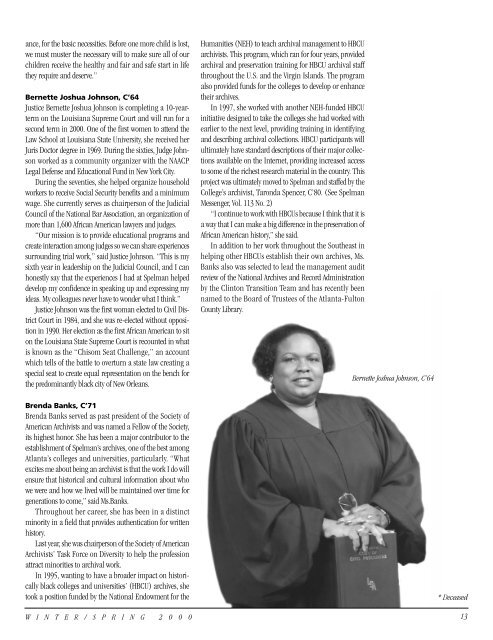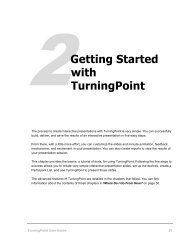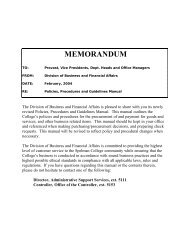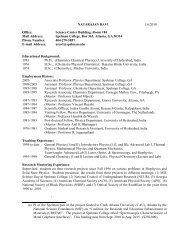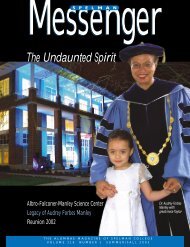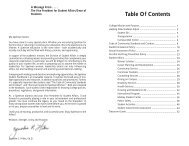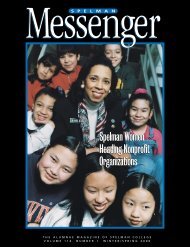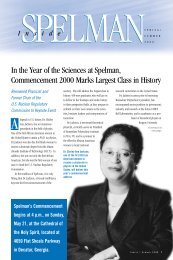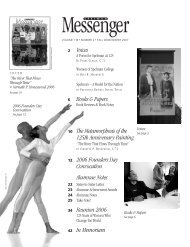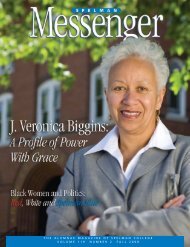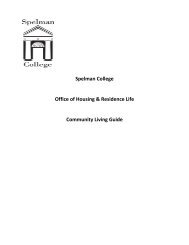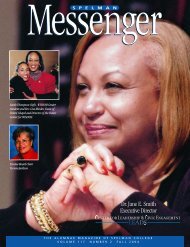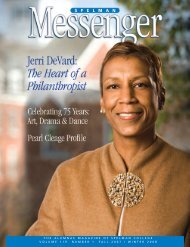(Vol. 114 No. 1) Text (PDF) - Spelman College: Home
(Vol. 114 No. 1) Text (PDF) - Spelman College: Home
(Vol. 114 No. 1) Text (PDF) - Spelman College: Home
- No tags were found...
Create successful ePaper yourself
Turn your PDF publications into a flip-book with our unique Google optimized e-Paper software.
ance, for the basic necessities. Before one more child is lost,we must muster the necessary will to make sure all of ourchildren receive the healthy and fair and safe start in lifethey require and deserve.”Bernette Joshua Johnson, C’64Justice Bernette Joshua Johnson is completing a 10-yeartermon the Louisiana Supreme Court and will run for asecond term in 2000. One of the first women to attend theLaw School at Louisiana State University, she received herJuris Doctor degree in 1969. During the sixties, Judge Johnsonworked as a community organizer with the NAACPLegal Defense and Educational Fund in New York City.During the seventies, she helped organize householdworkers to receive Social Security benefits and a minimumwage. She currently serves as chairperson of the JudicialCouncil of the National Bar Association, an organization ofmore than 1,600 African American lawyers and judges.“Our mission is to provide educational programs andcreate interaction among judges so we can share experiencessurrounding trial work,” said Justice Johnson. “This is mysixth year in leadership on the Judicial Council, and I canhonestly say that the experiences I had at <strong>Spelman</strong> helpeddevelop my confidence in speaking up and expressing myideas. My colleagues never have to wonder what I think.”Justice Johnson was the first woman elected to Civil DistrictCourt in 1984, and she was re-elected without oppositionin 1990. Her election as the first African American to siton the Louisiana State Supreme Court is recounted in whatis known as the “Chisom Seat Challenge,” an accountwhich tells of the battle to overturn a state law creating aspecial seat to create equal representation on the bench forthe predominantly black city of New Orleans.Humanities (NEH) to teach archival management to HBCUarchivists. This program, which ran for four years, providedarchival and preservation training for HBCU archival staffthroughout the U.S. and the Virgin Islands. The programalso provided funds for the colleges to develop or enhancetheir archives.In 1997, she worked with another NEH-funded HBCUinitiative designed to take the colleges she had worked withearlier to the next level, providing training in identifyingand describing archival collections. HBCU participants willultimately have standard descriptions of their major collectionsavailable on the Internet, providing increased accessto some of the richest research material in the country. Thisproject was ultimately moved to <strong>Spelman</strong> and staffed by the<strong>College</strong>’s archivist, Taronda Spencer, C’80. (See <strong>Spelman</strong>Messenger, <strong>Vol</strong>. 113 <strong>No</strong>. 2)“I continue to work with HBCUs because I think that it isa way that I can make a big difference in the preservation ofAfrican American history,” she said.In addition to her work throughout the Southeast inhelping other HBCUs establish their own archives, Ms.Banks also was selected to lead the management auditreview of the National Archives and Record Administrationby the Clinton Transition Team and has recently beennamed to the Board of Trustees of the Atlanta-FultonCounty Library.Bernette Joshua Johnson, C’64Brenda Banks, C’71Brenda Banks served as past president of the Society ofAmerican Archivists and was named a Fellow of the Society,its highest honor. She has been a major contributor to theestablishment of <strong>Spelman</strong>’s archives, one of the best amongAtlanta’s colleges and universities, particularly. “Whatexcites me about being an archivist is that the work I do willensure that historical and cultural information about whowe were and how we lived will be maintained over time forgenerations to come,” said Ms.Banks.Throughout her career, she has been in a distinctminority in a field that provides authentication for writtenhistory.Last year, she was chairperson of the Society of AmericanArchivists’ Task Force on Diversity to help the professionattract minorities to archival work.In 1995, wanting to have a broader impact on historicallyblack colleges and universities’ (HBCU) archives, shetook a position funded by the National Endowment for theW I N T E R / S P R I N G 2 0 0 0* Deceased13


